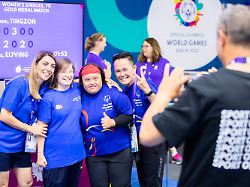“Double bang for inclusion”
Special Olympics create excitement
06/25/2023, 12:27 p.m
On the eight days of the World Games for the mentally and multiply handicapped, the number of visitors is large. Those responsible are very satisfied with the course of the Special Olympics. The World Games should also serve as a model for more inclusion at the upcoming major events.
Olaf Scholz was fascinated. Not even the intermittent bad weather clouded the Chancellor’s positive image of the Special Olympics in Berlin. “A really great event,” enthused Scholz: “It’s very exciting to see the athletes who take part here and who are very committed and totally involved.” Cheering athletes, euphoric fans and exciting competitions – the conclusion was not only clear for the Chancellor: The World Games for people with mental and multiple disabilities, which ended on Sunday evening with a closing party at the Brandenburg Gate, were a complete success.
He felt a “very peaceful, very Olympic mood,” emphasized Scholz, who preferred to attend a handball game indoors instead of athletics because of the constant rain: “It’s a good sign that many people are coming together here to relax a bit prove that you can take part and experience what is typical of the games: taking part is almost more important than winning.”
“We have to take the momentum, the joy and feasibility with us and ask ourselves how we can contribute to becoming more inclusive,” said Juliane Seifert, State Secretary in the Federal Ministry of the Interior and for Homeland, who after eight days of a “double boom for inclusion” spoke.
German team ensures best performance
Nevertheless, the German athletes also delivered a decent performance in terms of performance with numerous best performances and over 150 medals. “From a sporting point of view we can be more than satisfied,” said delegation leader Tom Hauthal. The organizers were also extremely happy. The colorful opening ceremony last weekend in front of more than 50,000 spectators in the Olympic Stadium was a successful start.
The response remained great. Many celebrities and a total of more than 330,000 visitors made the pilgrimage to the competitions, and the major event reached more than a billion international users online. The OC also felt confirmed when it came to choosing the competition venues, some of which were in the middle of the capital. “You felt like a star,” enthused beach volleyball player Kaya Schnöbel.
Politicians in Berlin, but also the German Olympic Sports Confederation (DOSB), should take note of the success of the Special Olympics with benevolence. They should only be the beginning. For 2036, exactly 100 years after the Nazi Games, an application for the Olympic and Paralympic Summer Games is planned.
“Exemplary for other major sporting events”
The World Games could be “exemplary for other major sporting events,” said Christiane Krajewski, President of Special Olympics Germany. She hopes that the “process” will really pick up speed as a result. “We have also shown with this major event that the Olympic Games are possible in Berlin,” added Berlin State Secretary Nicola Böcker-Giannini.
It remains to be seen what lasting effect the Special Olympics will have on issues such as inclusion, participation and diversity. In Germany, around eight percent of people with intellectual disabilities currently do sports. “16 is the next target number,” emphasized Krajewski. At some point, the rate should even be 32 percent – as with people without disabilities.
The sports landscape in Germany cannot be changed overnight. It is to be hoped that the visibility generated will also help clubs to open up. Politicians, which have repeatedly been photographed publicly at the sports facilities in the past few days, but also the sports associations are required. After all, the Special Olympics should have a sustainable, long-term effect.
